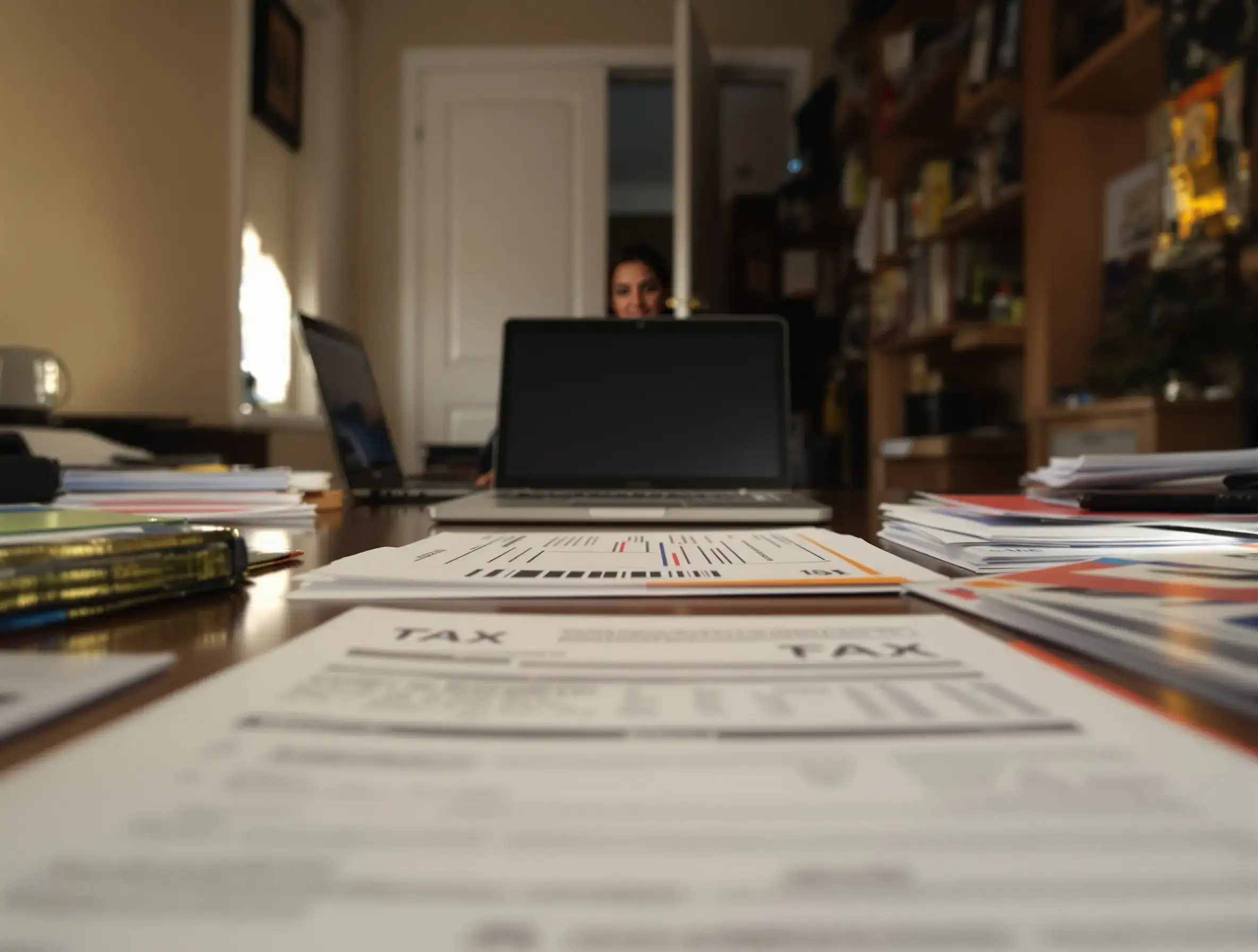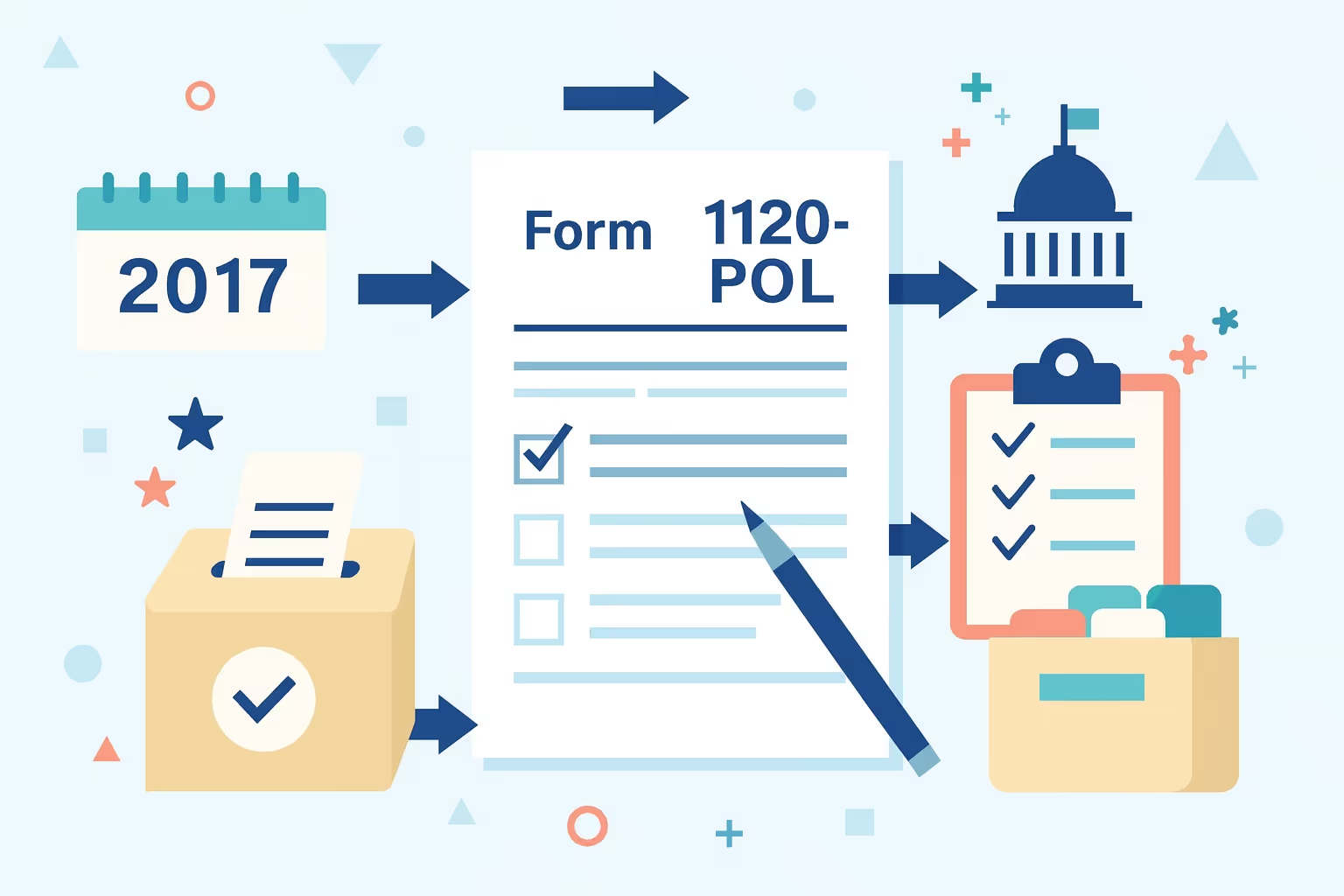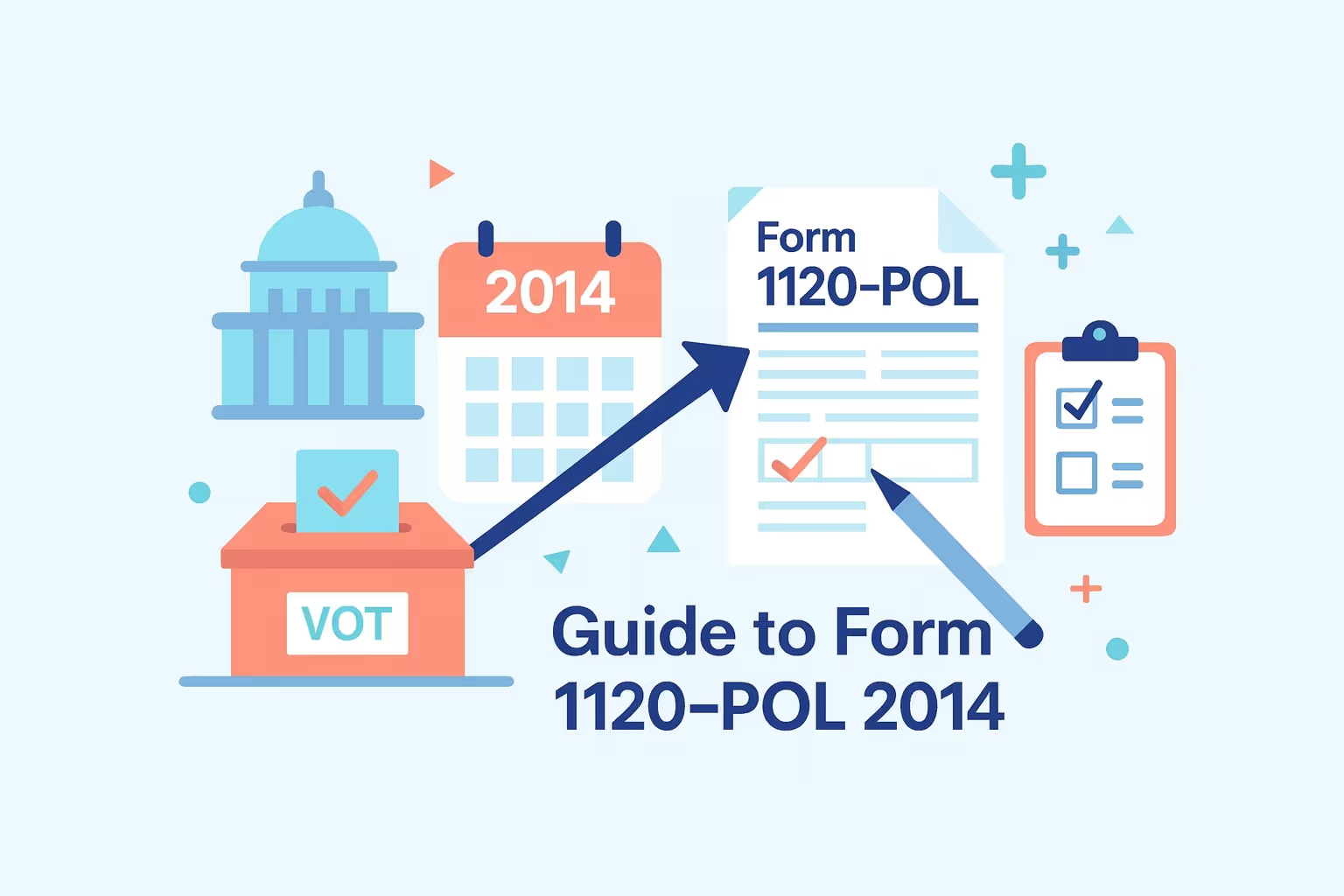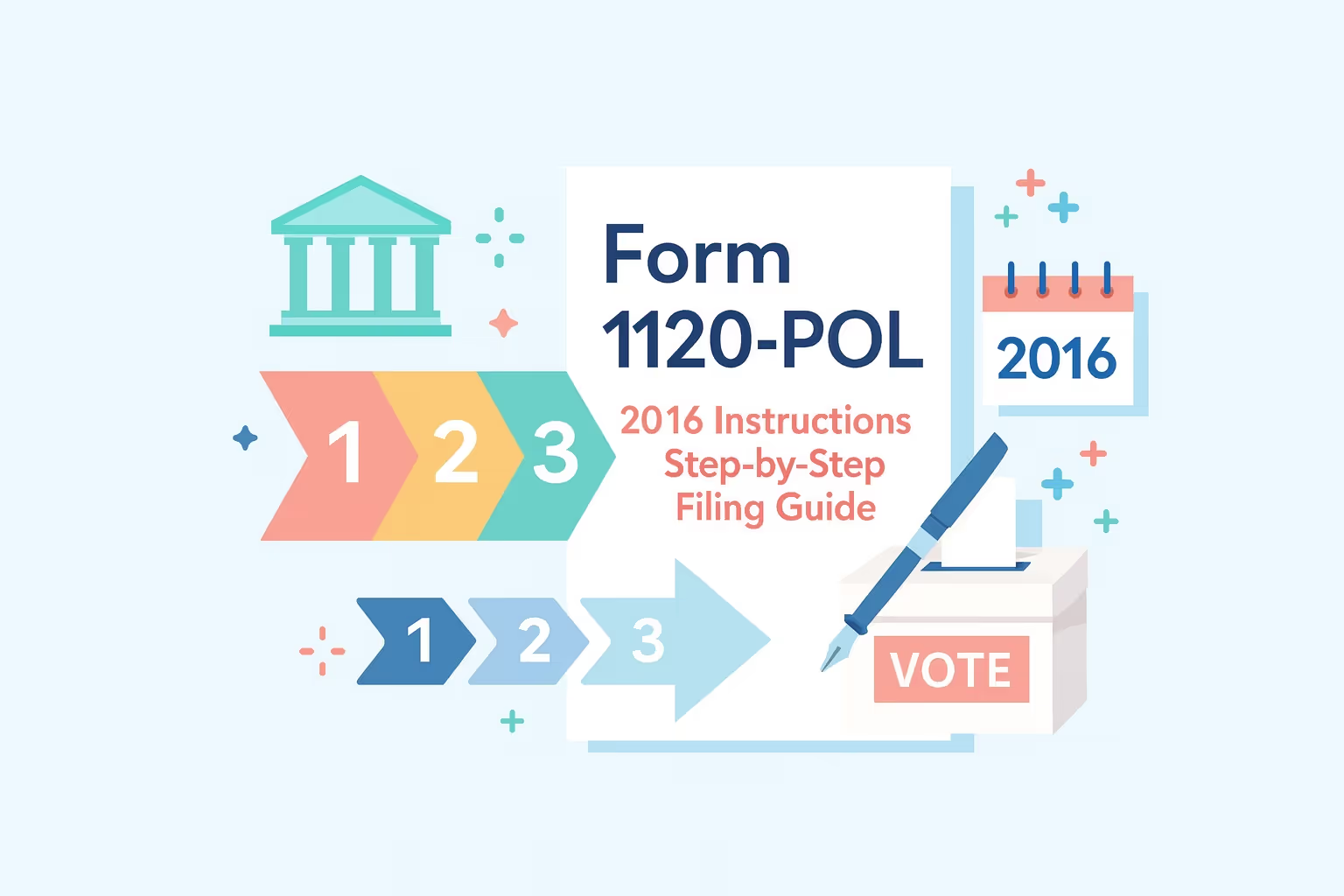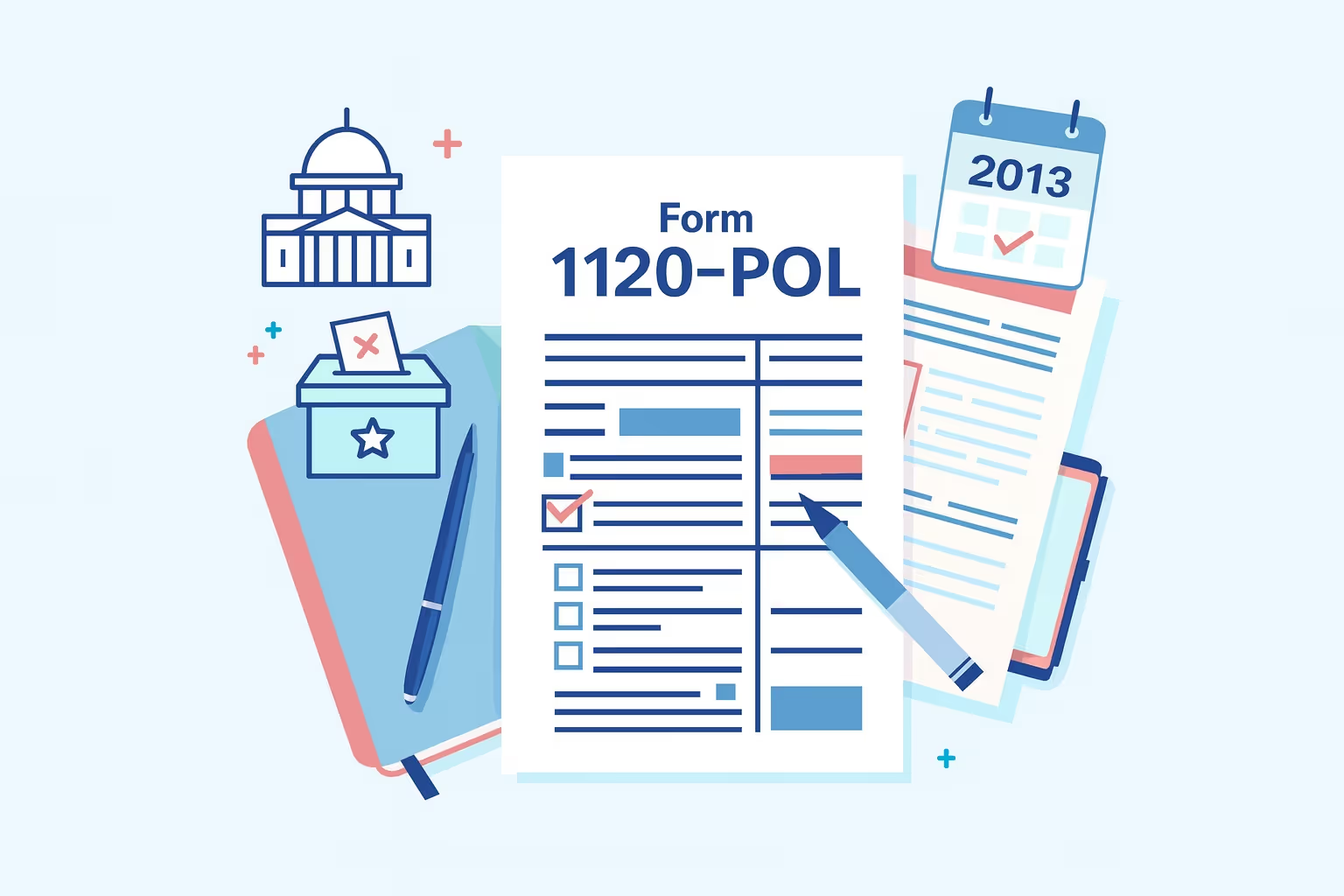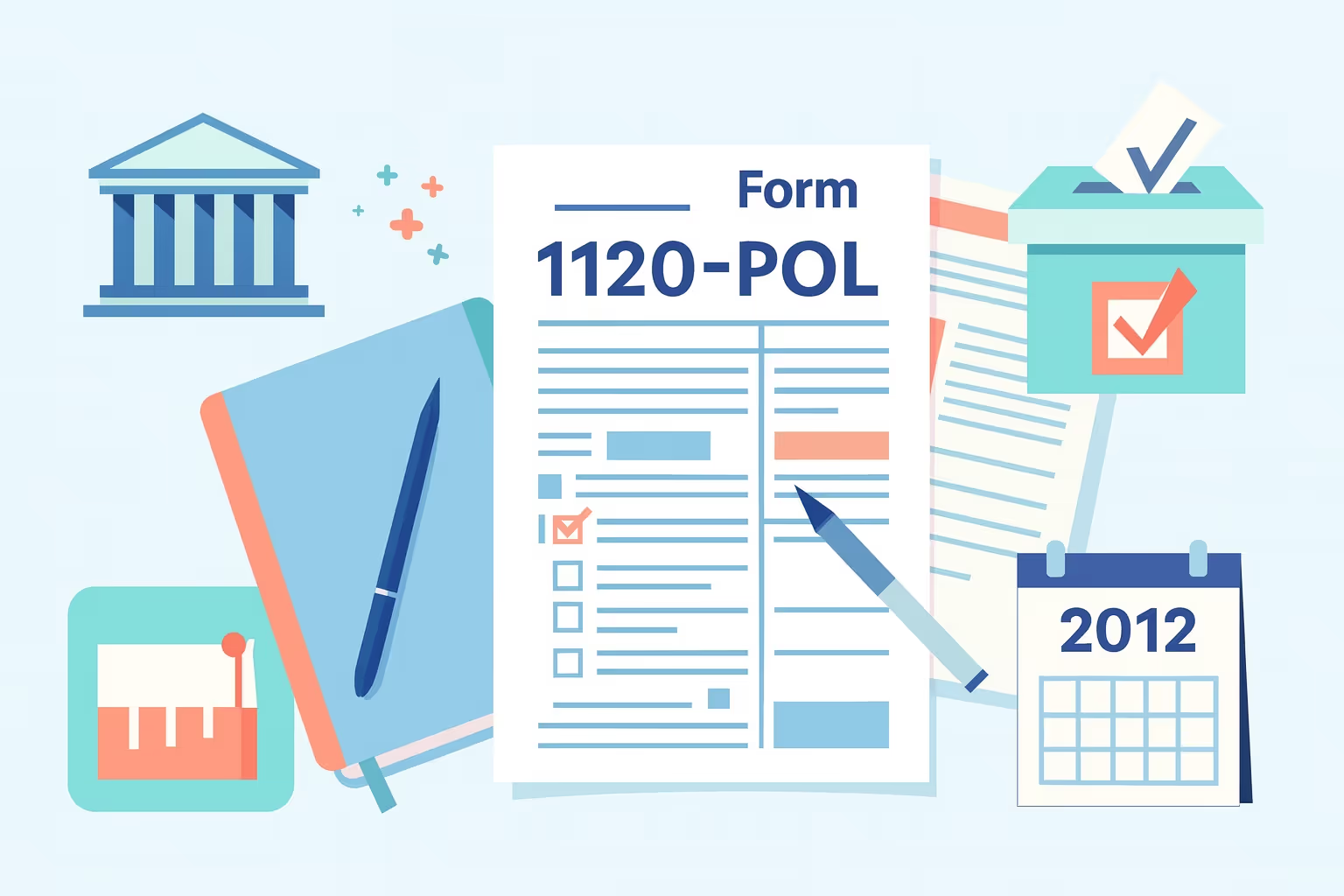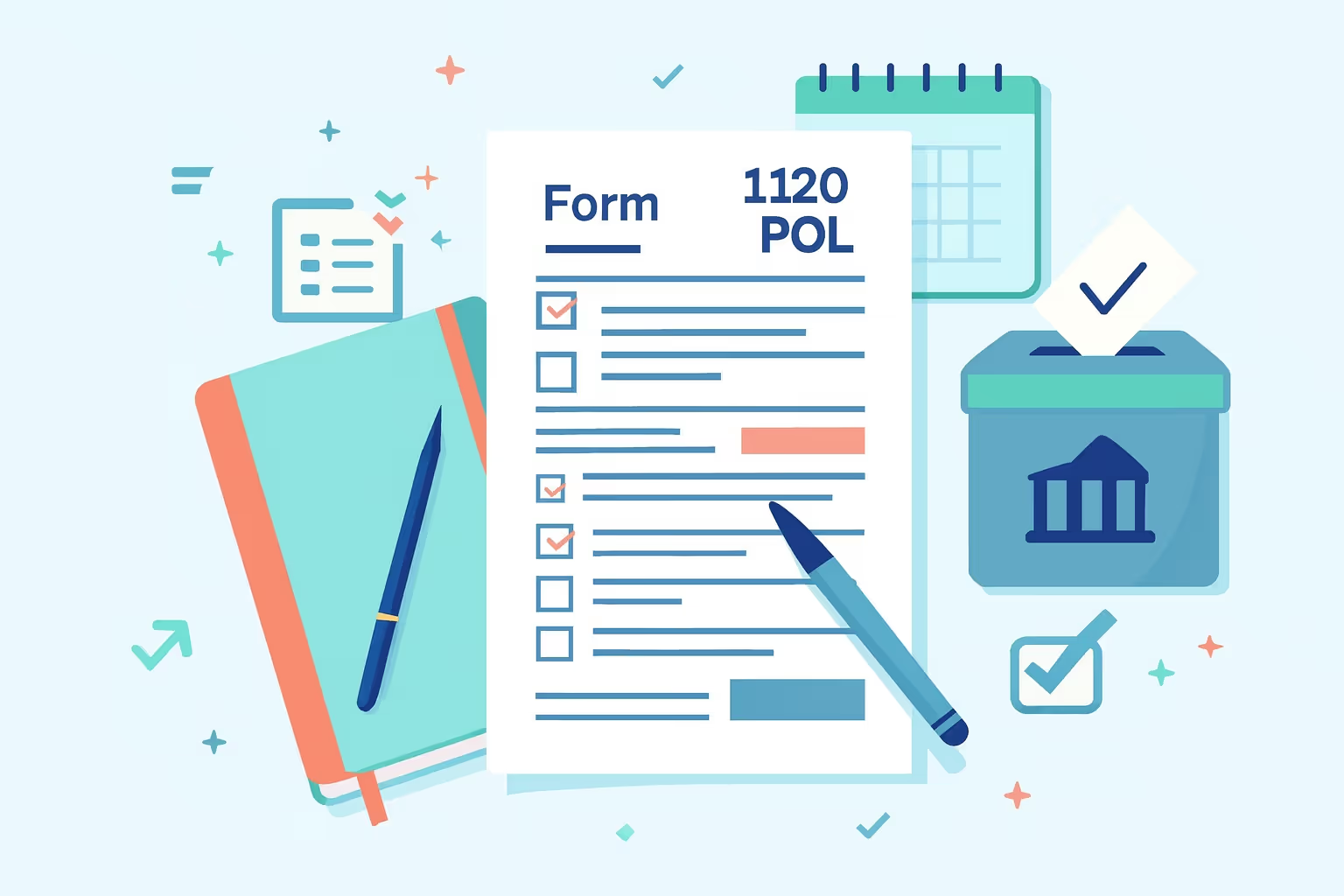
Form 1120-POL 2011 instructions provide essential guidance for political organizations that were required to report taxable income to the IRS. This federal tax return applies to Section 527 groups and specific exempt organizations that generated income outside their primary purpose. Although the filing deadline for the 2011 tax year has passed, reviewing the process helps taxpayers and preparers understand how political organizations meet compliance obligations.
The form requires careful attention to financial information, including dividends, interest, and other taxable income. Organizations must determine whether they qualify to file, gather supporting documents like receipts and schedules, and ensure accuracy when reporting income and deductions. A tax preparer or tax expert can assist with questions about filing requirements, but the process is accessible for those willing to review the instructions step by step.
This guide outlines how to complete the return, file it with the IRS, and submit payments using the required electronic system. Readers will also find guidance on common mistakes, how to handle years with zero activity, and tips for first-time filers. By understanding the rules, organizations can prepare returns accurately, avoid penalties, and maintain a good standing with federal tax authorities.
What Is IRS Form 1120-POL?
IRS Form 1120-POL is the federal tax return used by political organizations to report taxable income and calculate any income tax owed. It applies to groups that operate under Section 527 of the Internal Revenue Code, as well as specific exempt organizations that earn taxable income from non-political activities.
Who Must File Form 1120-POL?
An organization is required to file if it falls under one of the following categories:
- A political organization, whether exempt or not, that has taxable income to report.
- An exempt organization that is not a political organization but is treated as having taxable income under Section 527(f)(1).
What Counts as Political Organization Taxable Income?
Taxable income for political organizations may include:
- Investment income, including dividends, interest, and capital gains.
- Income from activities not related to the organization’s exempt function.
- Membership dues are paid in exchange for the benefits provided.
- Certain fundraising income is not directly connected to exempt purposes.
The form ensures that political organizations pay the correct amount of income tax on money earned outside their exempt activities. Even if an organization is generally exempt, it must still file if it earns taxable income. By understanding these rules, taxpayers, preparers, and organizations can meet their filing obligations and avoid compliance issues with the IRS.
Key Changes for Tax Year 2011
For the 2011 tax year, the Internal Revenue Service introduced significant updates that affected how organizations prepared their federal tax returns. The most important change was the requirement to use the Electronic Federal Tax Payment System (EFTPS) for all deposits and payments. Organizations were no longer allowed to send checks or money orders with Form 1120-POL.
Other updates included:
- Mandatory use of EFTPS for tax deposits and payments.
- Elimination of check payments sent with the return.
- Encouragement to file electronically, though it was not required in 2011.
- Minor formatting adjustments on the form will be made to improve clarity.
These changes required organizations to register with EFTPS in advance, schedule payments online, and maintain records of electronic confirmations. Proper planning was essential to avoid late payment penalties and maintain compliance with IRS requirements.
Step-by-Step Filing Instructions
Filing Form 1120-POL requires careful preparation and attention to detail. Each step ensures that the return is complete, accurate, and ready for submission to the IRS.
Step 1: Determine if Filing Is Required.
An organization must confirm whether it qualifies to file Form 1120-POL.
- Calculate total taxable income, including investment income such as dividends, interest, and capital gains.
- Review revenue from non-exempt activities, such as fundraising unrelated to political purposes.
- Identify membership dues that provide benefits to members, as these may be taxable.
- If any taxable income exists, Form 1120-POL must be filed, even if the organization is otherwise exempt.
Step 2: Gather Required Information.
Before completing the form, gather the necessary financial information and documentation.
- Employer Identification Number (EIN)
- Financial records for the year, including receipts and bank statements
- Prior year’s tax return, if applicable
- Investment income statements (Forms 1099-INT, 1099-DIV)
- Documentation of political and non-political activities
- Records supporting deductions and adjustments
Step 3: Complete the Form.
Form 1120-POL has two pages that must be completed in full.
- Page 1: Enter organization details and report taxable income. This includes all investment income and other non-exempt revenue.
- Page 2: Report deductions, calculate taxable income, and determine the tax due. Ensure that each line is filled in, rather than using “see attached” as a placeholder.
- Accuracy is essential, as incomplete or incorrect entries can delay processing.
Step 4: Attach Required Schedules.
Additional forms and schedules may be needed depending on the organization’s activities.
- Schedule D for reporting capital gains and losses.
- Form 4562 for depreciation or amortization.
- Form 4136 for claiming credit on fuel taxes paid.
- Supporting statements that provide explanations for income classifications or deductions.
Attachments must be organized in the correct sequence: Form 1120-POL, followed by Form 4136, then schedules in alphabetical order, other forms in numerical order, and supporting statements last.
Step 5: Sign and Date the Return.
The form must be signed to be valid.
- An authorized officer of the organization, a trustee, or an assignee may sign on behalf of the organization.
- A paid preparer must sign if one was involved in completing the return.
- Unsigned returns are considered incomplete and may result in penalties or rejection.
Completing each of these steps carefully helps ensure that the organization’s federal tax return is accepted without delay. Proper documentation, accurate calculations, and adherence to IRS instructions protect taxpayers from penalties and keep political organizations in compliance.
Filing Methods and Deadlines
For the 2011 tax year, the filing deadline for Form 1120-POL was March 15, 2012. If the due date fell on a weekend or legal holiday, the IRS allowed filing on the next business day.
Political organizations had two filing options:
- Paper filing: Organizations mailed the completed return to the designated IRS processing center in Ogden, Utah. Care was needed to use the correct address, include all required schedules, and make a copy for records.
- Electronic filing: Although not mandatory in 2011, it was encouraged because it offered faster processing, built-in error checks, and electronic acknowledgment of receipt.
If an organization was unable to complete its return by the deadline, it could request an extension by filing Form 7004. The extension provided six additional months to file, but it did not extend the time allowed to pay taxes owed. Payments were still due on March 15, 2012.
Payment Instructions and EFTPS Requirement
For the 2011 tax year, all political organizations were required to use the Electronic Federal Tax Payment System (EFTPS) to pay taxes owed on Form 1120-POL. Payments could no longer be sent by check or money order with a return. This shift made advance registration with EFTPS critical to avoid penalties.
The EFTPS process included:
- Registering for EFTPS: Organizations enrolled online at eftps.gov and received a PIN by mail within 7–10 business days.
- Making payments: Users logged in, selected the correct form code (1120POL), and scheduled payments by 8 p.m. Eastern Time on the due date.
- Maintaining records: Organizations were advised to keep electronic confirmation numbers as proof of payment.
Alternative options, such as same-day wire transfers or Federal Tax Deposit coupons, were available in limited cases only. Since extensions to the filing did not extend the time to pay, organizations were required to make timely payments through EFTPS even if they filed Form 7004.
Required Schedules and Attachments
Completing Form 1120-POL often involves attaching additional forms and supporting documentation. The most common attachments include:
- Schedule D (Capital Gains and Losses): Required if the organization sold or exchanged capital assets or carried forward capital losses.
- Form 4562 (Depreciation and Amortization): Used when claiming depreciation on business property or amortization deductions.
- Form 4136 (Credit for Federal Tax Paid on Fuels): Filed if claiming credit for federal excise taxes paid on fuel.
Supporting statements may also be required to explain income classifications, deductions, or allocations between political and non-political activities. Attachments should be assembled in the following order: Form 1120-POL, Form 4136, schedules in alphabetical order, forms in numerical order, and all supporting statements last. Providing complete schedules and properly ordered attachments helps ensure accurate processing and reduces the risk of IRS inquiries or delays.
Recordkeeping and Documentation Requirements
Accurate recordkeeping is essential when preparing Form 1120-POL. The IRS requires organizations to maintain financial records that support the amounts reported on their returns. Records should be kept in a clear and organized manner so that they can be reviewed if questions arise.
Organizations should maintain:
- Receipts for expenses and deductions claimed on the return.
- Bank statements and investment records from financial institutions showing dividends, interest, or capital gains.
- Copies of prior-year tax returns for reference.
- Documentation separating political and non-political activities.
- Records of contributions, membership dues, and fundraising income.
The IRS generally recommends keeping records for at least seven years. Records should be stored securely, whether printed copies or encrypted digital files, to protect sensitive financial data. Reviewing records before completing the return ensures accuracy and reduces the risk of errors. Proper documentation also provides a clear audit trail in case the IRS requests verification.
Common Mistakes to Avoid
Errors in filing can result in penalties or processing delays. Common issues with Form 1120-POL include:
- Submitting incomplete forms, such as writing “see attached” instead of completing entry spaces.
- Mailing the return to an outdated IRS processing center address.
- Forgetting to sign and date the return causes it to be treated as incomplete.
- Attempting to include payment with the return, despite the EFTPS requirement.
- Misclassifying political versus non-political income leads to incorrect reporting.
- Omitting required schedules such as Schedule D or Form 4562.
Organizations are encouraged to create a checklist before filing to confirm all necessary forms, schedules, and signatures are included. Careful review of the return before submission helps maintain compliance, ensures accuracy, and reduces the need for follow-up with the IRS.
Penalties and Compliance Considerations
Failure to properly file Form 1120-POL or pay taxes owed can result in penalties. The IRS imposes a penalty of 5 percent of unpaid tax for each month a return is late, up to a maximum of 25 percent. If a return is more than 60 days late, a minimum penalty will be applied.
Late payment penalties are also assessed at 0.5 percent of the unpaid balance per month, with interest accruing until the tax is paid in full. These costs can increase the amount owed significantly over time. Organizations unable to pay should still file the return on time to reduce penalties and then work with the IRS to arrange payment options.
In some instances, taxpayers may request penalty abatement if they can show reasonable cause for the delay. Common examples include natural disasters, serious illness, or reliance on incorrect advice from a tax preparer. Contacting the IRS directly or working with tax experts and preparers can help organizations evaluate whether they qualify for relief. Taking proactive steps ensures compliance and minimizes financial risk.
Zero Activity and Dormant Organizations
Some political organizations experience years with little or no activity. Filing may still be required depending on the type of income earned during that year.
Situations where filing is required:
- An organization must file if it earns investment income, such as dividends, interest, or capital gains.
- Filing is required if the organization receives rental income or other non-exempt revenue.
- An organization must also file if it conducts fundraising activities that generate taxable income.
Situations where filing may not be required:
- An organization may not need to file if it has no income of any kind during the year.
- Filing may not be necessary if no political or non-political activities produced revenue.
- An organization that remains completely dormant with no financial activity may not be required to submit the form.
Even in dormant years, many organizations choose to file a zero-income return. Filing provides proof of compliance and helps maintain good standing with the IRS. Organizations should also keep detailed financial records and board meeting notes to document inactivity in case verification is required later.
First-Time Filer Tips
Filing Form 1120-POL for the first time can be challenging for new political organizations. Preparation starts with obtaining an Employer Identification Number (EIN), which is required for tax filings. Organizations also need to understand Section 527 rules governing tax-exempt status and taxable income.
First-time filers should:
- Collect organizational documents such as articles of incorporation, bylaws, and bank statements.
- Establish recordkeeping systems that clearly separate political and non-political activities.
- Track investment income, deductions, and expenses in detail.
- Consider making quarterly estimated tax payments if they expect to owe $500 or more.
- Evaluate whether professional assistance from a tax preparer or tax expert is needed.
Proper preparation helps new filers avoid errors and ensures that they meet all IRS requirements. Investing in sound systems early saves time and supports accuracy in future tax years.
Frequently Asked Questions
What is the Form 1120-POL 2011?
The Form 1120-POL 2011 instructions guide political organizations and certain trusts on how to prepare and file their federal tax return. The IRS requires taxpayers to report income such as dividends, interest, or other revenue not related to exempt activities. Following the process step by step helps ensure accuracy, meet deadlines, and provide the correct financial information when submitting the return to the IRS.
Who must file a federal tax return using Form 1120-POL?
A political organization must file this federal tax return if it earns taxable income, including dividends, interest, or capital gains from a financial institution or bank. Even tax-exempt groups may qualify if they have income not tied to exempt purposes. Taxpayers must file the return directly with the IRS, include all required schedules, and sign the completed forms to maintain compliance with federal tax laws.
Can a tax preparer or a tax expert help with Form 1120-POL?
Yes, a tax preparer or tax expert can help organizations review financial information, receipts, and schedules to ensure the accuracy of the return. Professional services often utilize tax filing software to simplify and secure the process. Customers who need expert assistance can contact our office today to request guidance and determine if they qualify for deductions that can reduce their income tax and potentially increase their refund.
What deductions or expenses can be included on this tax return?
Organizations may include deductions for expenses directly tied to producing taxable income. This can consist of bank fees, trust expenses, and specific interest costs. Mortgage interest, employee-related costs from an employer, and other qualified expenses may also be applicable. Reviewing receipts and financial records before completing the forms helps taxpayers prepare accurate schedules. The IRS allows deductions only when they meet specific requirements under federal tax law.
How can taxpayers pay taxes owed under Form 1120-POL?
Payments must be submitted electronically through the IRS Electronic Federal Tax Payment System. Taxpayers log into their account, select the correct form code, and enter the amount they owe. This process ensures security and accuracy when transferring money from a bank. Taxpayers unable to pay in full should still file on time and request guidance or services to establish a payment plan, which can help reduce penalties and fees.
How can taxpayers request a refund or confirm the accuracy of a return?
If an organization overpays, the IRS processes a refund once the return is submitted. Reviewing every page for accuracy and keeping a copy of receipts and financial information is critical. Tax software can make it easy to print and file the completed forms. Customers who want to meet filing requirements quickly can find free guidance on the IRS website or contact a tax expert directly.









